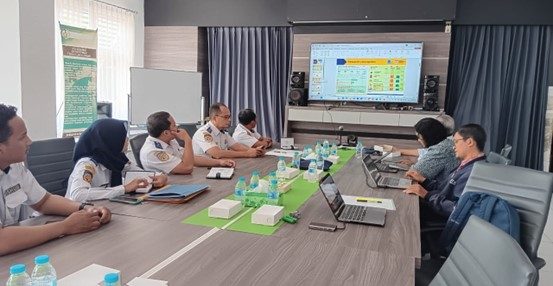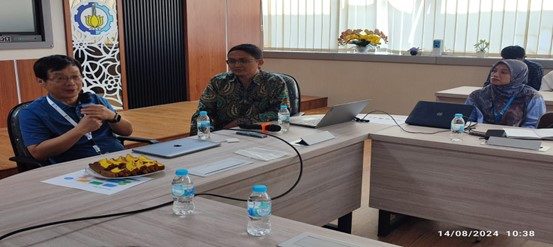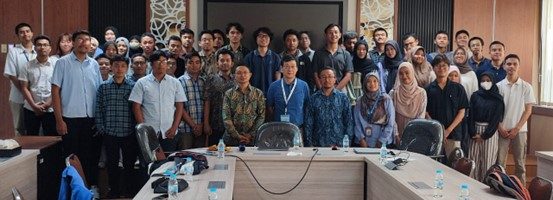Battery Recycling, Integration of Energy – Environment and Defense Technology Issues
Events
The problem of electric car battery waste is currently a concern because the world’s current need for green energy has increased the need for batteries and caused another problem, namely B3 waste from used batteries. According to government regulation no. 22 of 2021, battery waste is included in B3 because it contains heavy metals, so it requires special handling so as not to pollute the environment. In 2018, there were approximately 180 thousand tons of lithium ion that had expired (Melin et al, 2019) with 30% of the use of Lithium batteries being LiFePO4 batteries. Therefore, it is necessary to immediately recycle this battery waste, plus the increase in the CAGR value of the materials that make up lithium ion batteries from year to year by 24% shows that the potential for investing in the recycling industry is very promising (Yole, et al. 2020). On the other hand, the processing of battery waste or B3 must have a licensed TPA so that it can be sorted in accordance with Government Regulation Number 27 of 2020 concerning Specific Waste Management (E-Waste).
The Center for Sustainable Infrastructure and Environment (Puslit ILB), the Center for Internet of Thing and Defense Technology (Puslit IoTTP), the Department of Environmental Engineering and the Department of Materials and Metallurgical Engineering ITS collaborate in increasing attention and efforts to handle this battery waste problem. B3 waste pollution from unhandled batteries will indirectly endanger national security.

One of the observers of the battery waste problem who is also very interested is the Surabaya city government. This has become a concern along with the increasing number of Electric vehicles recorded as being used by the Surabaya City Transportation Agency. On Tuesday, September 2, 2024, a Focus Group Discussion (FGD) was held between the Surabaya City Transportation Agency and the ITS Environmental Team. The meeting was held in the ITS Environmental Engineering Department Accreditation Room.
The Transportation Agency was represented by 5 people, namely the Head of Transportation, Transportation Agency Sunoto. Head of Road and Passenger Transportation Ali Mustofa, Head of the Transportation Planning and Development Team, Transportation Sector Ismanto, Transportation Analyst Fandy Andrian and Sekar S. Meanwhile, from ITS, Prof. Joni Hermana, Prof. IDAA Warmadewanthi from Environmental Engineering. Lukman Noerchiem PhD and Dr. Widyastuti from the Department of Materials and Metallurgical Engineering. The discussion began with the plan to intensify the use of Electric cars in the Surabaya city government environment and the potential for handling Electric vehicle battery waste. The next presentation was delivered by Prof. Joni, Lukman N PhD and Dr. Widyastuti, about the types of batteries, the handling process from reuse to battery recycling including the recycling methods that can be chosen. The discussion was warm until the discussion of the legal umbrella of regulations used in waste management, policies to be made, storage places for electric vehicle battery waste and processing technology to be carried out.

Still related to Electric Vehicle Battery Recycling. On Wednesday, August 14, 2024 in the 5th Floor Meeting Room, ITS Research Center Building, a Research & Academic Collaboration Workshop was also held with the theme Lithium Ion Battery Recycling. This activity is a collaboration between: Institut Teknologi Sepuluh Nopember (ITS) Surabaya in collaboration with the United State Agency for International Development (USAID), US Consulate General Surabaya, Taipei Economic and Trade Office (TETO), National Taiwan University of Science and Technology (NTUST), Widya Mandala Catholic University Surabaya (UWM), National Research and Innovation Agency (BRIN), and together with the Taiwan Indonesia Science & Technology Innovation Center (STIC) Consortium,
The speakers at this activity were Dr. Hongbin Yu from Arizona State University. Lukman Noerchiem PhD from the Department of Materials Engineering as the moderator and the presenter from ITS was Dr. Widyastuti who also came from the Department of Materials and Metallurgical Engineering ITS. The discussion began with Dr. Hongbin Yin’s presentation on battery waste processing in the USA in general, regulations and research results currently being worked on by Dr. Hongbin and his team. The presentation was continued by Dr. Widyastuti on research and development of Battery Recycle in Indonesia, followed by the potential for development and research on Battery Recycle by the ITS Team. Currently, the ITS battery team is collaborating with Chulalongkorn University Thailand and Meiji University Japan in research on battery recycling in the eAsia 2023 scheme. Also research related to the circular economy in the development of a Battery Recycle pilot plant with Nangyang Technological University (NTU) Singapore in the INSPIRASI 2024 research scheme. The workshop with Dr. Hongbin Yu was continued with a fairly warm discussion from participants consisting of many students from various departments and ended with opportunities for research collaboration, further study scholarships and internship opportunities.

Latest News
-
Battery Recycling, Integration of Energy – Environment and Defense Technology Issues
The problem of electric car battery waste is currently a concern because the world’s current need for green energy
-
DRPM (Internet of Things and Defense Technology Research Center/IoTTP) ITS Signs Guided Rocket Cooperation Agreement with BRIN Rocket Technology Center (Pustekroket)
On Tuesday, September 10, 2024, a Cooperation Agreement (PKS) was signed between ITS, represented by the Directorate of Research
-
International Seminar: International Conference on Sciences, Nano, and Healthcare Technology 2024
Post Views: 0





